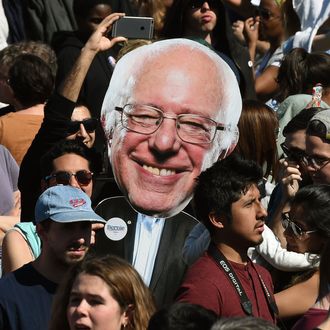
One of the big empirical mysteries of the 2016 presidential race is why Bernie Sanders is doing so exceptionally well among self-identified independents who participate in Democratic primaries. It’s coming up again in the context of loud Sanders campaign complaints about the closed Democratic primaries being held tomorrow and next Tuesday. Aren’t independents supposed to be more “moderate” than Democrats? Could Sanders’s appeal to indies make him a stronger general-election candidate than Clinton?
At FiveThirtyEight today, University of Pennsylvania professor Dan Hopkins sheds some light on these questions. Based on extensive prior research on Democratic-leaning independents, Hopkins notes that these voters tend to be roughly as liberal as self-identified Democrats (especially “weak” Democrats), but more critical of the political system generally and more critical of Barack Obama particularly. Among Democratic-leaning indies, the more liberal among them — like the more liberal among the Democratic-identifying groups — tend to support Sanders against Clinton. Perhaps more important are some demographic factors:
Among Democrats and independents who lean Democratic, the independent leaners are more likely to be male, white and higher-income — and at the same time, they have less positive views of President Obama. In short, the demographics and attitudes that tend to predict being an independent who leans Democratic are those that predict Sanders support.
Add in youth, which other analysts have suggested increases the proclivity to self-identify as independent apart from ideology or actual voting behavior, and you can certainly begin to see the Fellowship of the Bern.
But let’s look ahead to the general election: Is Sanders’s appeal to independents an important asset as a general-election candidate? Maybe not so much.
According to Hopkins, Democratic-leaning independents were less likely to vote for Mitt Romney in 2012 than were weak Democrats. So they are not the “swing voters” of yore, poised ideologically between the two parties and deciding between them at the last moment. And their relative party uniformity in voting also indicates Hillary Clinton should do very well in this demographic if she wins the Democratic nomination, give or take a few points for “enthusiasm.”






























